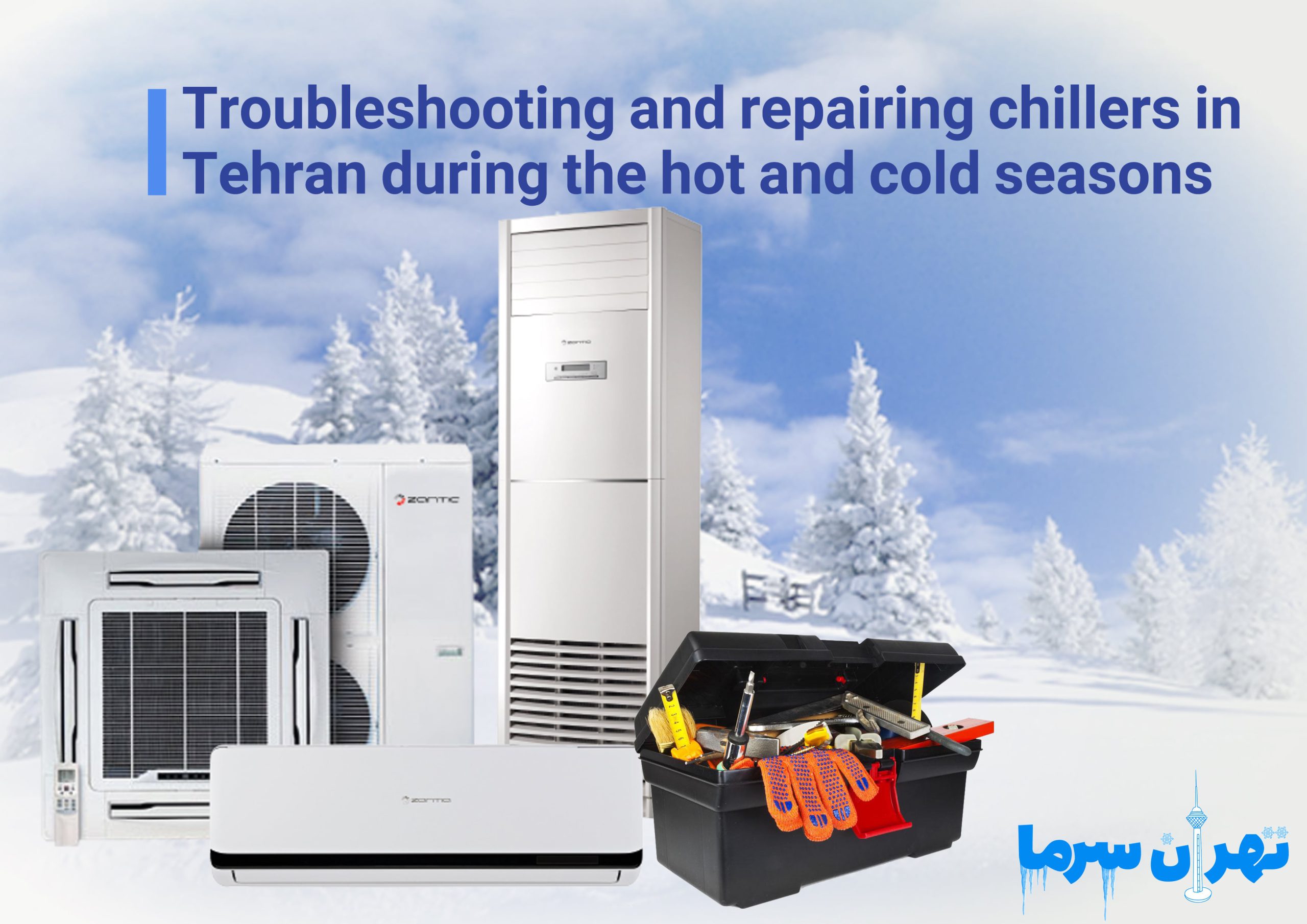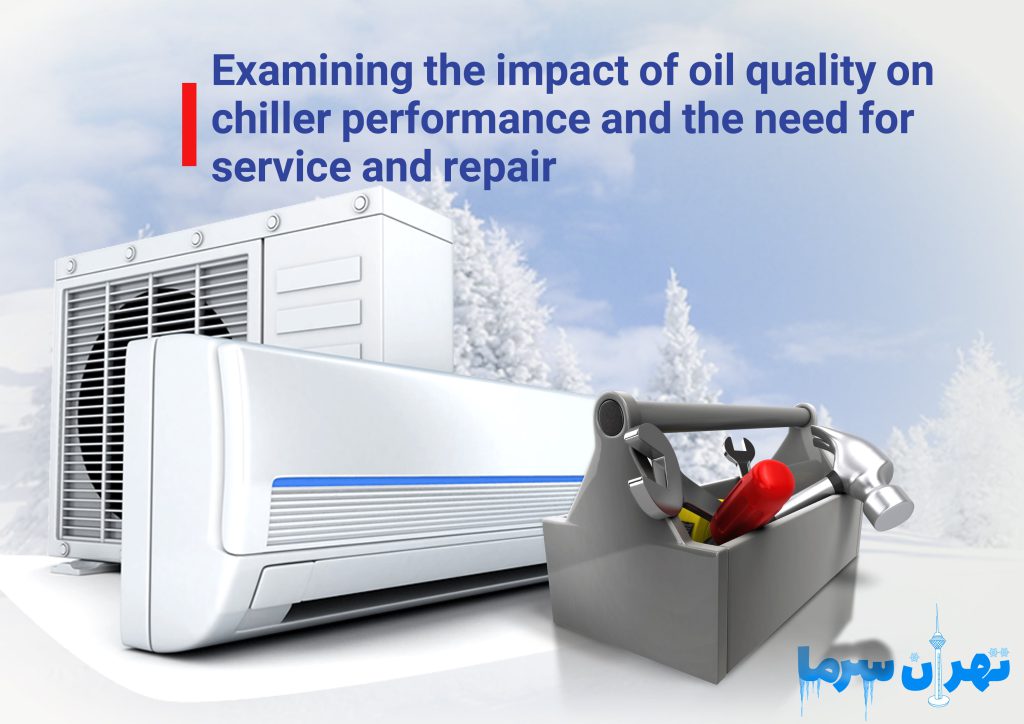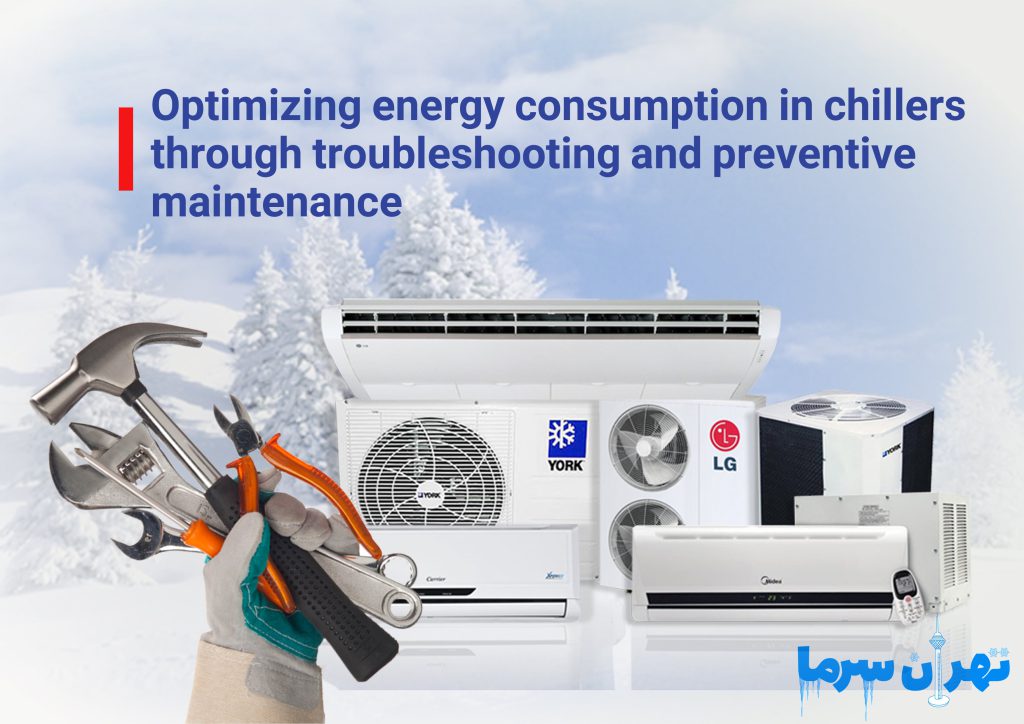Uncategorized
Troubleshooting and Repairing Chillers in Tehran During Hot and Cold Seasons

Troubleshooting and Repairing Chillers in Tehran During Hot and Cold Seasons
Troubleshooting and repairing chillers is a specialized process that requires technical knowledge and experience. Periodic service and maintenance can prevent serious issues and ensure optimal system performance. If you are looking for chiller troubleshooting and repair services in Tehran, using professional technicians can be a great solution to increase the lifespan and efficiency of your equipment.
Troubleshooting and Repairing Chillers in Tehran During Hot and Cold Seasons
Chillers are among the most important cooling equipment used in buildings, commercial centers, industrial facilities, and hospitals to provide the necessary cooling. The proper operation of these systems directly impacts occupant comfort, production efficiency, and energy consumption reduction. Given Tehran’s climate, which features hot summers and cold winters, chiller troubleshooting and repair in different seasons are crucial. Each season brings specific issues and challenges for chillers, and thorough inspections and timely maintenance can prevent serious malfunctions.
Common Chiller Issues in the Hot Season
During the summer, chillers operate continuously to maintain the desired temperature. This high workload can lead to various issues, including:
- Increased Condenser Temperature: Due to extreme heat, air-cooled chiller condensers may not function efficiently, increasing system pressure and reducing efficiency. In such cases, servicing and cleaning the condenser are essential.
- Reduced Compressor Efficiency: High ambient temperatures add extra load to the compressor, leading to increased electricity consumption and a higher risk of internal component failure.
- Refrigerant Leaks: Excessive heat can increase refrigerant gas pressure, leading to leaks in pipes and connections, which negatively impact overall system performance.
- Sensor and Controller Failures: Temperature and pressure sensors are critical for proper system operation. High ambient temperatures may disrupt their functionality, requiring recalibration.
Common Chiller Issues in the Cold Season
Unlike summer, some chillers remain in use during winter for industrial processes, specialized HVAC systems, and other applications. This season presents its own unique challenges:
- Freezing in Water Circuits: If the system is not properly insulated, water in the pipes and heat exchangers may freeze at low temperatures, leading to pipe bursts or evaporator damage.
- Refrigerant Pressure Drop: Cold weather can lower refrigerant gas pressure, disrupting chiller performance, especially in compression chillers that require precise pressure settings.
- Decreased Compressor Oil Efficiency: Low temperatures can alter compressor oil viscosity, reducing lubrication and increasing internal component wear. Regular oil quality checks and timely replacements are crucial.
- Control System Malfunctions: Some controllers and sensors may not function properly in cold conditions, necessitating inspections and recalibrations.
The Importance of Preventive Maintenance in Different Seasons
To prevent these issues, regular maintenance and preventive servicing are essential. Some key maintenance tasks for chiller troubleshooting and repair in Tehran during hot and cold seasons include:
- Inspecting and cleaning condensers and evaporators to ensure proper heat exchange and increase system efficiency.
- Monitoring and adjusting refrigerant pressure to prevent efficiency loss or excessive power consumption.
- Checking and replacing filters to prevent contamination from entering the system and reducing component wear.
- Adjusting and inspecting compressor oil to enhance performance and prevent potential damage.
- Calibrating sensors and control equipment to maintain system accuracy.
- Insulating pipes and heat exchangers, especially in winter, to prevent freezing.
The Impact of Oil Quality on Chiller Performance and the Need for Maintenance and Repair
Oil plays a crucial role in compression chillers, directly affecting component wear reduction and system efficiency optimization. One common issue caused by low oil quality is increased friction in the compressor, leading to higher operating temperatures. This temperature rise can damage internal components and decrease overall system performance. Additionally, poor-quality or contaminated oil may cause deposits and blockages within the compressor, reducing cooling capacity and increasing energy consumption.
Another important impact of oil quality on chiller performance is maintaining lubrication properties under different temperature conditions. High-quality oil performs well over a wide temperature range and prevents severe viscosity fluctuations. Conversely, lower-quality oils may lose lubrication properties at high temperatures or become excessively thick at low temperatures, both of which can cause chiller malfunctions.
Oil contamination is another factor that negatively affects chiller performance. Moisture, suspended particles, and unwanted chemical compounds in the oil can alter its properties and reduce lubrication efficiency. Contaminants typically enter due to leaks, improper oil changes, or using unsuitable oil. In such cases, friction between components increases, raising the likelihood of premature compressor failure.
To minimize the need for chiller servicing and repairs, selecting the right oil and maintaining it properly is essential. Using oils with thermal stability, oxidation resistance, and anti-wear properties can extend compressor component life and reduce maintenance costs. Furthermore, timely oil changes and regular quality monitoring through periodic analysis can prevent sudden failures and enhance overall system efficiency.
The Impact of Dirty Condenser Fins on Chiller Performance and the Need for Troubleshooting and Repair
Dirty condenser fins reduce the unit’s ability to dissipate heat. As a result, the refrigerant’s discharge temperature increases, forcing the system to raise the compressor’s working pressure to compensate. Increased pressure not only raises energy consumption but also accelerates internal component wear and increases the likelihood of breakdowns. This issue is particularly significant for air-cooled chillers, which heavily rely on proper condenser function.
Another problem caused by dirty condenser fins is increased condenser temperature and reduced chiller cooling capacity. When effective heat transfer is hindered, high-side cycle pressure rises, decreasing overall system capacity. This can lead to higher chiller water outlet temperatures, impacting overall HVAC performance. In such cases, users may notice reduced chiller efficiency and require troubleshooting and repairs.
Condenser fin contamination can include dust, grease, soot, and other environmental pollutants. In urban and industrial areas like Tehran, these contaminants are more prevalent, making condenser cleaning and maintenance especially important. If not addressed promptly, these contaminants can block airflow paths and, in some cases, lead to fin corrosion. Corrosion not only reduces thermal efficiency but also increases repair and replacement costs.
To prevent issues caused by dirty condenser fins, periodic inspections and cleaning are essential. Various methods can be used to clean the condenser, including compressed air, washing with water and specialized detergents, and even using specific equipment to remove tough contaminants and grease. Performing these tasks regularly not only maintains chiller efficiency but also reduces energy consumption and extends equipment lifespan.
The Impact of Scaling in Heat Exchangers on Performance and Chiller Repair Costs
Scaling in chiller heat exchangers is a major factor in system efficiency reduction and increased troubleshooting and repair costs. The accumulation of mineral deposits and water impurities on heat exchanger surfaces lowers heat exchange efficiency, raising the chiller’s operating temperature. This puts extra strain on the compressor, increasing energy consumption. Such conditions can lead to decreased cooling capacity, longer operating cycles, and ultimately, premature failure of critical components. To prevent these problems, regular servicing and periodic heat exchanger cleaning are essential, as they maintain system performance and significantly reduce operational and repair costs.
Optimizing Chiller Energy Consumption Through Preventive Troubleshooting and Repair
Optimizing chiller energy consumption through preventive troubleshooting and repair plays a key role in reducing operational costs and extending equipment lifespan. Issues such as refrigerant leaks, dirty condensers, reduced compressor efficiency, and incorrect system control settings can increase power consumption and decrease cooling performance. By implementing routine maintenance programs, including periodic inspections, proper system parameter adjustments, and cleaning key components, chiller efficiency can be preserved while preventing excessive strain on the system. This approach not only reduces energy costs but also minimizes unexpected failures and improves overall system performance.
Why Choose Tehran Sarma Engineering Company for Chiller Troubleshooting and Repair
For chiller troubleshooting and repair, Tehran Sarma Engineering Company is a reliable and professional choice. This company offers precise and efficient services using a team of expert technicians, advanced equipment, and up-to-date knowledge in refrigeration systems. With extensive experience in repairing various types of absorption and compression chillers, along with the use of original parts and standardized troubleshooting methods, Tehran Sarma enhances efficiency, reduces energy consumption, and extends system lifespan. Additionally, the company provides preventive maintenance programs and periodic servicing to prevent sudden breakdowns and minimize repair costs. Trusting Tehran Sarma ensures optimal chiller performance and peace of mind in HVAC system maintenance.
For more information on cold storage construction pricing, visit the Tehran Sarma website or contact us at 09121906418 and 02177972256.
Chiller troubleshooting and repair are essential for maintaining optimal system performance. Timely maintenance and servicing can prevent costly failures and improve system efficiency. If you are looking for professional chiller troubleshooting and repair services in Tehran, you can consult experienced specialists in this field.
Source:
https://www.coldstorageus.com/
https://unitedinsulated.com/




 سردخانه
سردخانه برق
برق کمپرسور
کمپرسور کمپرسور بیتزر
کمپرسور بیتزر کمپرسور کوپلند
کمپرسور کوپلند کمپرسور بوک
کمپرسور بوک کمپرسور دانفوس
کمپرسور دانفوس کمپرسور منیروپ دانفوس
کمپرسور منیروپ دانفوس کمپرسور امبراکو
کمپرسور امبراکو کمپرسور پاناسونیک
کمپرسور پاناسونیک کمپرسور سابکول
کمپرسور سابکول کمپرسور کوپلند
کمپرسور کوپلند کمپرسور اسکرال کوپلند
کمپرسور اسکرال کوپلند کمپرسورفراسکلد
کمپرسورفراسکلد کمپرسور رفکامپ
کمپرسور رفکامپ کمپرسور اسکرال دانفوس
کمپرسور اسکرال دانفوس گاز مبرد
گاز مبرد گاز R22
گاز R22 گاز R134
گاز R134 گاز R404
گاز R404 گاز R407
گاز R407 گاز R410
گاز R410 گاز R508
گاز R508 کندانسور هوایی
کندانسور هوایی اواپراتور
اواپراتور اواپراتور آرشه
اواپراتور آرشه اواپراتور صابکول
اواپراتور صابکول اواپراتور آسه
اواپراتور آسه اواپراتور نیک
اواپراتور نیک اواپراتور آرتک
اواپراتور آرتک اواپراتور نوین
اواپراتور نوین اواپراتور تبادل کار
اواپراتور تبادل کار درب
درب ساندویچ پنل
ساندویچ پنل فن سردخانه
فن سردخانه روغن کمپرسور سانیسو
روغن کمپرسور سانیسو متعلقات سردخانه
متعلقات سردخانه